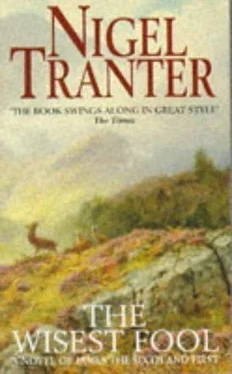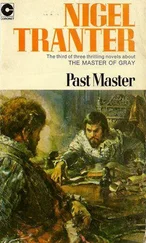Nigel Tranter - The Wisest Fool
Здесь есть возможность читать онлайн «Nigel Tranter - The Wisest Fool» весь текст электронной книги совершенно бесплатно (целиком полную версию без сокращений). В некоторых случаях можно слушать аудио, скачать через торрент в формате fb2 и присутствует краткое содержание. Жанр: Исторические приключения, на английском языке. Описание произведения, (предисловие) а так же отзывы посетителей доступны на портале библиотеки ЛибКат.
- Название:The Wisest Fool
- Автор:
- Жанр:
- Год:неизвестен
- ISBN:нет данных
- Рейтинг книги:4 / 5. Голосов: 1
-
Избранное:Добавить в избранное
- Отзывы:
-
Ваша оценка:
- 80
- 1
- 2
- 3
- 4
- 5
The Wisest Fool: краткое содержание, описание и аннотация
Предлагаем к чтению аннотацию, описание, краткое содержание или предисловие (зависит от того, что написал сам автор книги «The Wisest Fool»). Если вы не нашли необходимую информацию о книге — напишите в комментариях, мы постараемся отыскать её.
The Wisest Fool — читать онлайн бесплатно полную книгу (весь текст) целиком
Ниже представлен текст книги, разбитый по страницам. Система сохранения места последней прочитанной страницы, позволяет с удобством читать онлайн бесплатно книгу «The Wisest Fool», без необходимости каждый раз заново искать на чём Вы остановились. Поставьте закладку, и сможете в любой момент перейти на страницу, на которой закончили чтение.
Интервал:
Закладка:
Everybody looked at Abercorn, who frowned, puffed, shrugged and intimated that he accepted the situation, especially as it seemed to be the Queen's own wish.
Balmerino nodded relievedly, muttered something to Linlithgow, and then announced that His Majesty's Court of Session found the accused Margaret Hartside guilty of the charge stipulated. In view of the fact that she had already served a considerable period in ward, however, they would limit sentence, in mercy. The panel would pay the full sum of the jewels' worth, even though they had already been restored, namely four hundred and ten pounds Sterling, by way of amercement and fine. And she would be condemned to perpetual exile in the Isles of Orkney, in the care of her husband. This for judgment. God Save the King! As they all stood up, Heriot permitted himself a sigh of relief.
"Who pays the fine?" old Sir Peter Young murmured in his ear, with a chuckle. "You needna have unseated me, Geordie! I'd have agreed the judgment." "Perhaps, sir. But we could not be sure."
"And you're willing to pay twice ower for those gewgaws, eh? And smile to do so! There's mair to this than meets the eye, I'm thinking."
'The motto of my house is 'I Distribute Cheerfullie'," George Heriot pointed out, mildly.
When Heriot had engineered this Hartside trial for the month of May 1608, his main preoccupation had been to create an excuse and official reason for getting away from Court, for a much more personal concern-his own wedding. James's odd finances, and desire to have his banker constantly at hand, made such escapes to Scotland difficult to arrange. On this occasion the King, needless to say, had found some other services for his friend to engage in while he was at it-his unconcern with the Queen's problems being remarkable. Unfortunately the monarch was not the only one in a position to be awkward about George Heriot's affairs, however. James Primrose meantime was also a factor to reckon with. Alison had written tearfully more than a month earlier, to say that her father had gone back on his word-or, at least, that he was now insisting that the marriage be postponed for still another year. He said that he could not meantime dispense with his daughter's services; that he found himself in no position to raise the five thousand merks dowry for another year, and that anyway, in his judgment, Alison was still too young for marriage. The fact was that his wife was ill and he required the girl's attendance at home to look after the invalid, his house and the enormous brood. And he was in a position to enforce this delay, unhappily, since his daughter was still under the legal age of consent So, however little Heriot cared about the dowry, wedded bliss was still not yet.
His beloved, therefore, was no longer to be sought, with Mary Gray, in pleasant Strathearn, but skied and tied in frustrating domesticity at the top of the tall tenement town house in Edinburgh's Lawnmarket, nursing an ailing stepmother and seeking to manage an unruly household of high-spirited children, while she coped with the moods of a preoccupied sire, who, by the very nature of his office and employment was going through a most difficult period. He was not really an ill-natured or particularly selfish man, although inclined to pomposity; but, with some reason, he felt, and proclaimed, that her problems, though real enough, were truly minor, ephemeral, and in no sense comparable with his own.
The fact was that Scotland was falling into a condition bordering on anarchy-the rot stemming from the top, not the bottom. And this was not so much reflected as concentrated in the Privy Council, of which Primrose was the unfortunate secretary and factotum. The ancient kingdom had undergone many crises in its long history; but never before had it suffered by having no resident monarch or regent, no undoubted voice of authority nearer than four hundred miles away-a vital matter in a highly monarchical form of government. Long-range control just did not suit Scotland, either its institutions or the character of its people. Added to this, the Reformation, later here than anywhere else in Christendom, was still not settled and secure. Lacking decisive on-the-spot direction, it could, and looked as though it might, suffer overturn, and Catholicism be re-established. A large part of the nobility and aristocracy had never changed; many who had, had done so only in name, to gain former Church lands-and some of these were now frankly toiling back to the old religion; and the vast Highland area, with certain Lowland hegemonies also, were still predominantly Catholic. The Kirk, deliberately weakened and riven by James's policy, and the imposition of bishops again, was split, and its aggressively left-wing Presbyterian faction harsh and out-of-sympathy with most of the people, and therefore not the bastion of Protestantism it could have been. In consequence, the Privy Council, made up so largely on a hereditary basis, but with the bishops an added and uneasy dimension, was split, not so much down the middle as in three warring sections. And, as it happened, its presently most influential members were on the Catholic side -the Chancellor, Dunfermline, and Secretary of State and Lord President Balmerino-to Protestant James Primrose's discomfort and distress. Moreover, in all this ferment, the dark hand of the Master of Gray was at work, skilfully stirring, suborning, dividing, a hidden hand but with much gold in it, most evidently. Small wonder if Alison's father was in no frame of mind for domestic distractions.
There was no room for Heriot in the already overcrowded Primrose house in the Lawnmarket, and he had long given up his grace-and-favour quarters in Holyroodhouse. So he lodged meantime with his half-brother James, above the shop in Beith's Wynd opposite the Lesser Kirk of St Giles. The ancient walled city of Edinburgh was a positive warren of tall tenements, lands, closes, wynds and beetling masonry, all huddled together on the narrow spine which ran down from the castle to Holyrood, with deep valleys on either side. James Heriof s house was, in fact, no more than two hundred yards from James Primrose's-although there were some dozen storeys of difference.
To gain any privacy the betrothed couple found a problem, in these circumstances. In Alison's own house there was never a room unoccupied; and James Heriot's was smaller, and little better. His brother rapidly had enough of sitting amidst the noise of the Lawnmarket house's cooped-up, racketing children, and when the girl could escape for a little, they took to meeting in the unromantic and constricted ambience of the little office behind the Beith's Wynd goldsmith's booth. Admittedly it had on many occasions in the past been graced by the monarch's presence; but it was scarcely a lovers' nest.
These all too brief interludes were not wholly taken up with dalliance and matters of no concern to other than the parties involved, however. Alison was well versed in current affairs, had sharp ears and shrewd wits. Although scarcely so keen an interpreter of matters politic as was Mary Gray, she was an able observer of the scene, and because of her father's employment and friends, in a position to overhear much and gather more. From her, Heriot learned that Lord Balmerino was thought to be tottering to a fall. Dunbar, it was said, was determined to bring down his former friend, coveting the complete rule in Scotland. To bring down the Chancellor also-but this was considered secondary. The odd circumstance was that the Master of Gray appeared to be abetting Dunbar in this-even though Balmerino was a Catholic and Dunbar a Protestant. The now commonly spoken of Catholic resurgence, master-minded by Gray-it was not so much a plot as a movement-appeared, strangely enough, to be going to jettison the most powerfully-placed Catholic of all, Balmerino, the Chief Secretary. No doubt Patrick Gray had his reasons-one of which might well be the unpaid fifteen thousand merks due to the late Robert Logan's estate; but then, equally, Dunbar's eighteen thousand was likewise unpaid, and Gray, an heir-general, was, if not actually working with Dunbar, seemingly on a parallel course. It was all a great mystery.
Читать дальшеИнтервал:
Закладка:
Похожие книги на «The Wisest Fool»
Представляем Вашему вниманию похожие книги на «The Wisest Fool» списком для выбора. Мы отобрали схожую по названию и смыслу литературу в надежде предоставить читателям больше вариантов отыскать новые, интересные, ещё непрочитанные произведения.
Обсуждение, отзывы о книге «The Wisest Fool» и просто собственные мнения читателей. Оставьте ваши комментарии, напишите, что Вы думаете о произведении, его смысле или главных героях. Укажите что конкретно понравилось, а что нет, и почему Вы так считаете.












